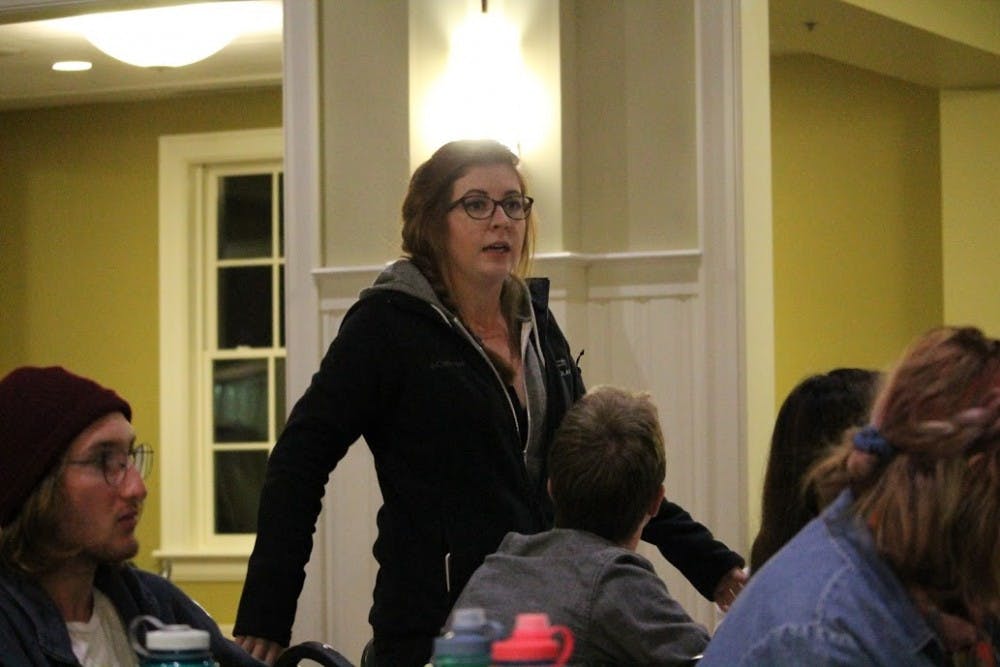“Does anybody have any questions?” is a common question asked after a class lecture or informational meeting in college. What’s not so common, though, is students ever actually raising their hands to ask questions at the end of an event.
With free pizza and raffle tickets involved, one might have assumed that most students wanted to take their chances at winning a gift card and receiving free dinner, and leaving shortly after the meeting concluded.
But that was not the case at the annual Public Safety Meeting for Off-Campus Students Thursday night, where Director of Public Safety Gerry Gregg and Director of Residence Life Chris Haug gave roughly 45 students tips on stay safe in their off-campus community. A question and answer session between attendees and Gregg and Haug about the relationship between students and Public Safety wrapped up the discussion.
“This is an opportunity to give everybody the information about being a good neighbor and how to be a contributing community member,” Haug said. “It’s an opportunity to help remind students of university expectations for behavior and letting (off-campus) students know they are not alone.”

Gregg began the meeting by sharing tips with students on how to be a better neighbor, protect personal belongings and be aware of personal safety.
He emphasized being aware of your surroundings as one of the most important aspects of off-campus safety. According to Gregg, this includes not being distracted by technology or wearing headphones when walking, never walking alone, demonstrating confidence while walking, and always trusting one’s instincts if a situation feels off.
Gregg also mentioned some reports of break-ins in off-campus houses since the start of this year and, as a result, encouraged students to lock cars and remove valuables from the trunks, as well as locking their houses at all times.
Twenty minutes into the meeting, Gregg touched on the importance of students introducing themselves to neighbors to show respect and courtesy. He then proceeded to ask students if they had any questions.
Immediately, students’ hands shot into the air, and the tone of the meeting shifted for the next 30 minutes.
“I was wondering what the University’s plan is on helping to mend the increasingly toxic relationship between Public Safety and the students?” asked junior business major Tera Earlywine.
Gregg proceeded saying he “did not know” of the toxic relationship between students and Public Safety but continued, “If you have a problem at your house, the only time we will be there is if someone complains. We aren’t driving around the neighborhood looking to make your life miserable.”
Other questions that came up included students feeling scared to go to Public Safety, and asking why the University doesn’t include medical clemency in our student handbook. Medical clemency is a policy at some other universities that allows students to seek help in drug- or alcohol-related emergencies without being referred to the student conduct process.

Haug did not go into detail about why medical clemency is not in the University’s student handbook, but did say he is open to a conversation about making that part of campus policy.
“Because I know first hand of the goodness of a UP student, I know that the majority of students are gonna say, ‘I don’t care what the other ramifications are, I want to get this person help,’” Haug said.
Haug said he lives in the off-campus neighborhood along with many students, and emphasized his impression of the goodness of UP students: “For the most part, don’t you agree UP students are very kind human beings? I think that UP students really look out for one another.”
“I came because I was unaware of the regulations that P-safe was held to when interacting to the students and I’m still kind of unaware,” Earlywine said at the end of the event. “I feel like they kind of beat around the bush a lot when talking to us.”








